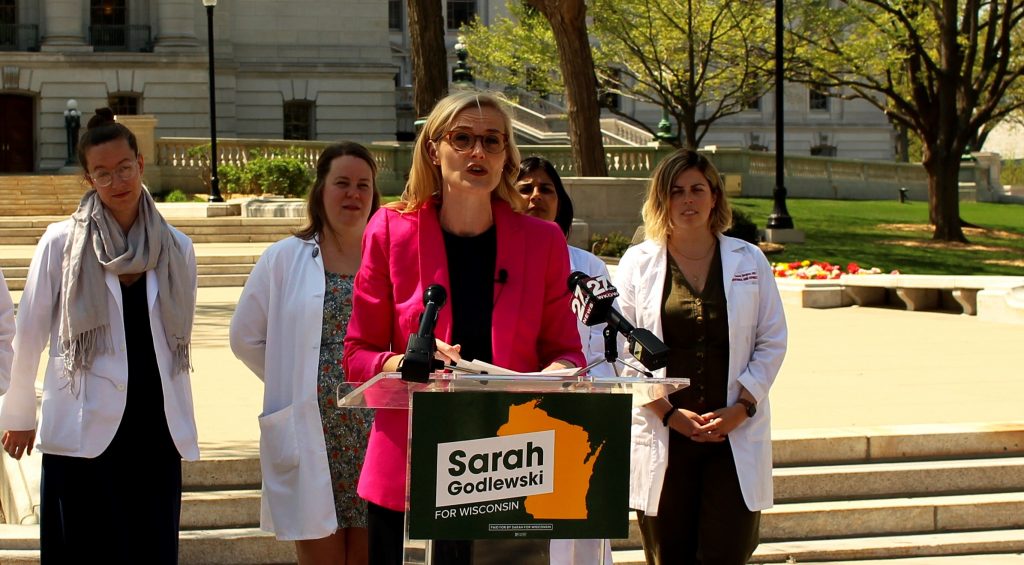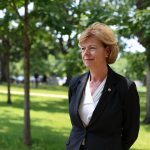Godlewski Crafts ‘Common Sense’ Campaign
Democratic U.S. Senate candidate stresses ‘kitchen table’ issues and abortion rights.

Flanked by a group of medical doctors, Sarah Godlewski speaks at a press conference May 13, 2022, on preserving abortion rights. Godlewski is campaigning for the Democratic nomination to run for Senate against Republican Sen. Ron Johnson. Photo by Henry Redman/Wisconsin Examiner.
In the Democratic contest to challenge Republican Sen. Ron Johnson’s bid for a third term, each of the leading candidates has hit hard on the anticipated U.S. Supreme Court ruling to overturn the federal right to abortion. But one candidate has hit it harder than any other.
In the weeks since Politico posted a draft high court opinion that would overturn the 1973 Roe v. Wade decision legalizing abortion, Sarah Godlewski has targeted the issue with a more intense, singular focus than any of her rivals who share the same view.
While the leaked draft has given the issue new urgency, it’s not a new one for the Godlewski campaign. Shoring up federal law to protect abortion rights was “one of the reasons why I got into this race,” she says.
In November 2021 she released a digital ad a month before the Supreme Court arguments in the Mississippi case that is the subject of the leaked opinion. “I’m tired of politicians who treat reproductive freedom as an afterthought. It’s a fundamental fight for our health care,” she told viewers.
In an interview Godlewski, who describes herself as a lifelong Democrat, reiterates the six-month-old ad’s message even more sharply.
“I’m frustrated with my own party, because we’ve had 50 years to codify [Roe],” she says. “And we’ve had the White House, the Senate and the House, and we still haven’t gotten it done. And I believe one of the reasons is that we need more pro-choice Democratic women at that U.S. Senate table, because we think about this every single day. It’s our life.”
She followed that with a round table event for women who spoke about what it was like seeking abortion before Roe. Then she held a news conference in Madison with women physicians, where she took direct aim at the Republican incumbent she hopes to run against in November.
Johnson “urged the Supreme Court to make this decision. He even co-sponsored legislation that would put doctors in jail,” Godlewski said at her press conference in front of the state Capitol. At the prospect of Wisconsin’s 1849 abortion ban taking effect, she added, “he even said that if Wisconsinites don’t like it, they can move.”
‘Kitchen table issues’
Notwithstanding the intensity of her focus on abortion, Godlewski doesn’t present herself as a single-issue candidate.
She sums up her campaign as one “focusing on kitchen table issues, and how we are going to address them.” Abortion rights, she contends, is part of that.
A rural plan includes provisions for expanding broadband internet access, addressing medical care shortages, improving education funding and resources, supporting funding for programs to combat climate change and helping family farms. She’s held round table meetings on water quality, including contamination from PFAS chemicals, and on mental health.
The right for women to make decisions about their own health care, is of a piece with issues that include lowering the cost of prescription drugs and expanding affordable, quality child care, argues Godlewski, who is the mother of a 2-year-old. “We’ve got to get this stuff done,” she says. “And I think, to me, what’s so frustrating is these issues continue to be political footballs, but they are common sense, pragmatic things that Wisconsinites want.”
From Eau Claire to D.C. and back
Godlewski, who grew up in Eau Claire, traces her lineage in Wisconsin back five generations and describes herself as the daughter of “two retired public school teachers.”
After graduating in 2004 from George Mason University in Virginia with a major in peace and conflict resolution, Godlewski went to work for Booz Allen Hamilton. The consulting firm placed her in projects with the federal government, primarily with the Department of Defense. In 2012 she was hired by Arapahoe County in Colorado as the county’s director of performance management.
Along the way, she also volunteered on a regional council for UNICEF USA, which supports the United Nations agency. There she met Max Duckworth, an investor. They married, asking friends and family to donate to UNICEF in place of wedding gifts, and directed the funds to Belize, where they combined a honeymoon with visits to local leaders and organizations that were the beneficiaries.
The investment firm work sparked her first venture into political office, she says. With MaSa Partners, Godlewski says she learned about the trouble that Wisconsin businesses and entrepreneurs had attracting investment capital. She recalls contacting the State Treasurer’s office, thinking she could play a volunteer role in encouraging more in-state investments by the state investment board and employee trust fund.
She got no response, and learned that the treasurer’s office itself was heading for the discard pile.
Since 2003, lawmakers had removed many of the duties from the independently elected treasurer, assigning them to the revenue and administration departments, both run by appointees of the governor. In 2016 and again in 2017, the Legislature passed resolutions to amend the Wisconsin Constitution and do away with the office altogether.
Amendment advocates — primarily Republicans — argued that almost all of the position’s power as an independent financial authority for the state had already been taken from it. All that remained was a statewide referendum for voters to ratify the change.
“I thought that was wrong. Wisconsin would have been one of the only states without a chief financial officer,” Godlewski says. “I thought it was a big power grab for Gov. [Scott] Walker.”
‘Political nobody’
She launched a campaign to defeat the referendum. “Everybody told me that there was no way that I was going to win,” she says. “They’re like, ‘There’s nothing you can do about it. This is going to happen.’”
Instead, the referendum failed, with nearly 62% of voters in the April 2018 election voting against eliminating the office. Godlewski followed up by running for treasurer herself. “Wisconsin deserves somebody who was going to deliver for them in this role,” she says.
Traveling the state “as a political nobody from Eau Claire,” she came out ahead in a three-way Democratic primary that August, and went on to win the statewide race in November by more than 107,000 votes. “In a race that people said didn’t matter, I flipped more Trump counties than the governor, lieutenant governor and attorney general — including flipping Ron Johnson’s own home county, Winnebago,” she says.
Even with the official duties of the office substantially diminished from what they were two decades ago, Godlewski has raised its profile. One way has been to brand it as an information source and bully pulpit on targeted consumer finance issues.
Democratic Gov. Tony Evers appointed her to chair a task force on retirement security that he established in his first year in office. She established a task force on home ownership in 2020, and leveraged that role to ally with nonprofit organizations as well as other Evers administration departments on projects to combat home tax foreclosures, prevent eviction, promote home ownership and encourage saving.
While the office has no official role in the process of developing the state’s biennial budget, Godlewski’s office posted a web page on the budget process, including a look back at the 2019-21 budget.
Under the constitution, the state treasurer’s remaining principal role has been to serve, along with the secretary of state and the attorney general, on the Board of Commissioners of Public Lands (BCPL). The board manages timber sales on 77,000 acres that it still controls out of the millions of acres of federal land that was granted to Wisconsin by the federal government in the 19th century. The remainder of those federal land grants were sold off in the late 1800s; the proceeds went into state trust funds that now hold $1.4 billion, which the BCPL also oversees.
The board distributes earnings from the Common School Fund, one of those funds, to public school libraries. It also makes loans for public projects around the state.
When Godlewski took office, along with newly elected Attorney General Josh Kaul, the makeup of the three-member board shifted to all Democrats. Godlewski assumed the role of chair, and the board killed a rule enacted previously under a Republican majority banning advocacy on climate change. It also began accepting applications to finance clean energy projects.
In 2020, after the body gave a record $38 million to school libraries, she initiated an additional $5.3 million payout to help offset new school expenses brought on by the COVID-19 pandemic, such as improving internet service for remote learning and acquiring digital textbooks.
Godlewski lists the actions she has taken as treasurer along with initiatives like the additional COVID-19 payout to schools as accomplishments that illustrate her penchant for action — and as arguments against Johnson. She alludes to votes Johnson has cast against federal COVID relief, including the American Rescue Plan Act (ARPA) in March 2021, as well as Johnson’s elevation of fringe treatments for COVID-19 and vaccine misinformation.
“We need somebody who’s going to stop with the conspiracy theories and actually roll up their sleeves and get things done,” she says. “And that’s not what Ron Johnson is doing for the people of Wisconsin.”
Underestimated?
Along with Milwaukee Bucks executive Alex Lasry, Godlewski as a candidate has access to personal wealth that has helped her fund her campaign. Through March 31, 2022, Federal Election Commission reports show, she has bankrolled nearly two thirds of the $5.1 million that the campaign has raised so far, donating $360,000 as well as making a loan of $2.9 million.
Her wealth is primarily a byproduct of her marriage. (Upon taking office as treasurer, Godlewski formally stepped away from MaSa Partners, with Duckworth becoming the sole official partner in the firm.)
Supporters of the other Democratic Senate hopefuls have argued that Congress doesn’t need more multimillionaires — particularly running against Johnson, whose own wealth has helped him fund his past campaigns. In response, Godlewski leans in to her middle-class upbringing as well as the issues she has championed.
“I am the daughter of two public school teachers,” she says. “I worked at Pizza Hut to pay for college. And I graduated with over $75,000 in debt.”
She points to her priorities as treasurer and to bipartisan legislation she’s championed based on a concept proposed in the governor’s retirement security task force for a universal investment account for every child, seeded at birth. The bill was introduced earlier this year and got a public hearing, albeit after the Legislature had concluded its regular floor session work for 2022.
In the late April Marquette Law School poll that put Lasry within 3 points of front-runner Mandela Barnes, Godlewski doubled her support, reaching 7% in the survey — “growing faster than any candidate” in the race, as a missive from her campaign put it. The same poll found 48% undecided among the Democratic field.
State Rep. Jodi Emerson (D-Eau Claire), who got to know Godlewski during the campaign to keep the treasurer’s office and has endorsed her for the Senate, believes those numbers will get better and that the Supreme Court’s abortion leak has shaken up voters. “This is not a 50-50 issue,” Emerson says. “I think we’re going to see a fired-up electorate over the next couple of months.”
Emerson acknowledges that the treasurer almost certainly has less immediate name recognition than other statewide elected officials. But she says Godlewski is bolstered by a deep grass-roots network that she has built from her 2018 campaign, and the media exposure from seizing the reproductive rights issue after the leak can compound that: “I think that’s going to help people get to know her better faster, and once they know her, they do like her.”
Godlewski’s background and ability to relate to a broad swath of people — from working parents seeking child care to members of the “sandwich generation” who are caring for younger children and aging relatives at the same time — will help her in August and November both, Emerson says. And the Democrats can benefit from fielding a candidate in November who comes from outside the Milwaukee-Madison axis that is the party’s geographic base, she adds — helping them win more votes in rural areas and smaller cities.
“Godlewski is portraying herself as someone who can buck the trend of that geographic polarization,” agrees Chergosky, the UW-La Crosse political scientist. The subtext of her campaign, he says, is that she is the better bet in November: “She’s trying to carve out a lane for herself in which she can basically convince the Democratic primary voters of her electability in the general election.”
Godlewski is counting on her 2018 come-from-behind story and her brand of retail politics to demonstrate as much. “That’s how I win voters over,” she says. “I have been underestimated my entire career. And whenever somebody has told me what I can’t do, I’ve shown them what I can do.”
Sarah Godlewski claims a ‘common sense, pragmatic’ lane was originally published by the Wisconsin Examiner.





















